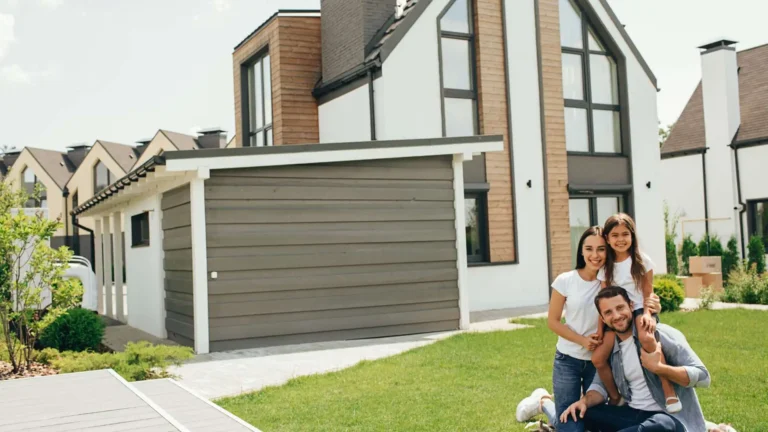Table of Contents
The Community Dream That Can Become a Financial Nightmare
As real estate and money coaches, we regularly help clients evaluate properties in homeowners’ association (HOA) communities. While HOAs promise manicured lawns, sparkling pools, and maintained property values, they also come with HOA Rules and Fees that can significantly impact your housing budget and lifestyle freedom. Understanding these regulations and costs upfront is crucial to making an informed real estate decision.
Many buyers focus intensely on the purchase price and mortgage payment while treating HOA fees as a minor add-on expense. This oversight can cost thousands annually and create ongoing financial obligations that many homeowners don’t fully understand until they’re legally bound to pay them.
The fine print in HOA documents contains rules, fees, and obligations that can dramatically affect your homeownership experience. Understanding these costs upfront helps you make informed decisions about whether HOA communities align with your financial situation and lifestyle preferences.
Beem’s Everdraft™ offers singles the flexibility they need — covering emergencies with no interest, credit checks, or due dates. It’s the extra cushion that keeps your finances stress-free. Download the app today!
What Are HOA Fees and How Much Do They Actually Cost?
Current HOA Fee Reality
National Cost Averages: HOA fees typically range from $200 to $400 per month nationwide, although they vary significantly by location and community amenities. Luxury communities, gated neighborhoods, and high-rise condominiums often charge $500-1,000+ monthly, while basic suburban HOAs might charge $100-250 monthly.
Geographic Variations: Retirement-heavy states like Florida, Arizona, and Nevada tend to have higher HOA fees due to extensive amenities and maintenance needs. Urban high-rise communities in cities like New York, San Francisco, and Chicago can cost over $2,000 per month for luxury buildings with doorkeepers, concierge services, and premium amenities.
Annual Financial Impact: Even modest HOA fees create substantial annual costs. A $300 monthly fee equals $3,600 yearly, comparable to property taxes in many areas. When combined with mortgage, insurance, and property taxes, HOA fees can push total housing costs beyond comfortable budget limits.
Fee Structure Variations: Some communities charge monthly fees, while others charge quarterly or annual fees. The payment frequency affects cash flow planning but not the total annual cost. Many HOAs also charge separate fees for specific services, such as trash collection, cable television, or internet access.
What HOA Fees Actually Cover
Common Area Maintenance: Most HOA fees fund landscaping, pool maintenance, clubhouse operations, elevator service, and building exterior upkeep. These services create the attractive community appearance that initially draws buyers to HOA neighborhoods.
Utilities and Services: Many HOAs include water, sewer, trash collection, and sometimes cable or internet in their fees. While convenient, these bundled services often cost more than individual arrangements and provide less flexibility for service changes.
Management and Administration: Professional management companies typically receive 10-20% of collected fees for financial management, rule enforcement, vendor coordination, and administrative services. This professional oversight helps maintain community standards, but it adds significant costs.
Reserve Fund Contributions: Responsible HOAs allocate 15-30% of fees to reserve funds for major future repairs and replacements. Inadequate reserves often lead to special assessments when expensive projects arise.
Why Do HOA Fees Keep Rising Every Year?
Inflation and Cost Pressures
Service Cost Inflation: Landscaping, maintenance, utilities, and insurance costs typically increase 3-8% annually, forcing HOAs to raise fees to maintain service levels. Professional management fees also increase with inflation, compounding the annual cost growth.
Infrastructure Aging: Older HOA communities face increasing maintenance costs as buildings, pools, HVAC systems, and common areas require more frequent repairs and eventual replacement. These aging infrastructure costs accelerate fee increases in mature communities.
Insurance Premium Spikes: Property insurance for HOA common areas has increased 20-40% annually in many regions due to extreme weather, increased claims costs, and reduced insurer competition. These insurance increases directly impact HOA budgets and resident fees.
Regulatory Compliance: New building codes, safety requirements, environmental regulations, and accessibility mandates often require expensive upgrades that HOAs must fund through fee increases or special assessments.
Mismanagement and Poor Planning
Inadequate Reserve Planning: Many HOAs historically underfund reserve accounts, creating situations where major repairs require emergency assessments rather than drawing from adequate savings. These planning failures force sudden, substantial fee increases.
Vendor Overpayments: Inexperienced volunteer boards sometimes sign expensive long-term contracts or fail to negotiate competitive pricing, resulting in higher fees to cover inflated service costs that professional oversight might have prevented.
Deferred Maintenance: Postponing necessary maintenance to keep fees low often results in more expensive emergency repairs and accelerated deterioration, ultimately costing residents more through higher future fees and assessments.
Financial Mismanagement: Poor accounting, inadequate budgeting, and a lack of financial oversight can lead to cost overruns, emergency borrowing, and the need for dramatic fee increases to restore financial stability.
What Are Special Assessments and When Do They Hit?
Understanding Special Assessment Triggers
Emergency Repairs: Hurricane damage, plumbing failures, structural problems, or electrical system failures can trigger immediate special assessments ranging from $1,000 to $ 15,000 per unit, depending on the severity and scope of the required repairs.
Infrastructure Replacement: Major systems, such as roofs, HVAC equipment, elevators, and parking surfaces, eventually require complete replacement. When reserve funds prove inadequate, these projects become special assessments costing $ 5,000 to $25,000 or more per homeowner.
Legal and Regulatory Compliance: Lawsuit settlements, building code violations, environmental cleanup requirements, or accessibility upgrades often result in unexpected assessments that can substantially exceed annual HOA fees.
Amenity Upgrades: Community decisions to renovate clubhouses, upgrade pools, install new playground equipment, or add security systems may trigger assessments even when not strictly necessary, driven by resident demands for improved facilities.
Assessment Payment Reality
Payment Timeline: Most HOAs provide 30-90 days’ notice for special assessments, though emergency repairs may require immediate payment. Large assessments sometimes offer payment plans, but these often include interest charges that increase total costs.
No Opt-Out Provision: Unlike voluntary home improvements, special assessments are mandatory regardless of individual financial circumstances or agreement with the expense. Non-payment can result in liens, foreclosure proceedings, and additional legal costs.
Financing Challenges: Many homeowners must borrow money to pay large assessments, often through high-interest personal loans, credit cards, or home equity loans that compound the financial impact through interest charges.
Property Sale Complications: Pending or recently paid special assessments can complicate property sales, either by reducing buyer interest or requiring disclosure that affects negotiating position and final sale price.
Which HOA Rules Can Cost You Money Through Violations?
Architectural and Aesthetic Violations
Unapproved Modifications: Installing satellite dishes, changing exterior paint colors, adding landscaping, or modifying driveways without obtaining architectural committee approval often results in fines of $ 100-$500 or more, plus mandatory reversal costs that can exceed thousands.
Maintenance Standards: Failure to maintain lawns, trim trees, repair exterior damage, or keep properties in pristine condition according to HOA standards can result in escalating fines, starting at $25-$ 100 and increasing with continued non-compliance.
Holiday and Seasonal Restrictions: Many HOAs limit holiday decorations, seasonal displays, or temporary installations with specific timing and appearance requirements. Violations often carry fines of $50-$ 200, plus removal costs.
Vehicle and Storage Violations: Parking commercial vehicles, boats, RVs, or trailers on property, using driveways for car repairs, or storing items in yards often result in immediate fines, as well as mandatory removal or storage costs.
Behavioral and Operational Violations
Pet Policy Infractions: Unleashed dogs, failure to clean up waste, unauthorized pet types, or exceeding pet limits can result in fines of $100-300, plus potential removal requirements that may force difficult decisions about beloved animals.
Noise and Disturbance Issues: Loud music, construction work outside permitted hours, party noise, or other disturbances often result in escalating fines, starting at $50-$ 150 and increasing with repeated violations.
Rental and Occupancy Violations: Unauthorized rentals, exceeding occupancy limits, or failing to register tenants with the HOA can result in substantial fines, as well as legal action that threatens rental income and property use.
Common Area Misuse: The inappropriate use of pools, clubhouses, or other facilities, bringing unauthorized guests, or violating facility hours can result in fines, as well as temporary or permanent suspension of facility access.
How Do Transfer Fees and Sales Restrictions Affect Property Values?
Document and Administrative Fees
Transfer Package Costs: HOA document packages required for property sales typically cost $200-800 and include financial statements, governing documents, meeting minutes, and compliance certificates. Buyers or sellers must pay these fees regardless of whether the sale is completed.
Application and Approval Fees: Many HOAs charge $100-500 for processing new owner applications, conducting credit checks, scheduling interviews, or reviewing tenant applications, adding costs to every property transfer.
Expedited Processing Premiums: Rush orders for HOA documents or approvals during quick sales often carry 50-100% premium charges, forcing sellers to choose between delays and additional costs during time-sensitive transactions.
Recording and Administrative Costs: Document recording, mailing, copying, and administrative processing fees add $50-200 to most transactions, representing pure profit for HOAs while creating additional closing costs for buyers and sellers.
Sales Process Complications
Right of First Refusal: Some HOAs can delay sales by exercising rights to purchase properties at agreed prices, creating uncertainty and potential delays that may discourage buyers or complicate financing arrangements.
Buyer Approval Requirements: Credit checks, interviews, application processes, and approval waiting periods can extend sales timelines, increase buyer frustration, and potentially eliminate qualified purchasers who refuse to submit to intrusive approval processes.
Rental Restrictions: Limitations on property rentals, tenant approval requirements, or rental caps can significantly reduce property values for investors while limiting owners’ flexibility to generate rental income during financial hardship.
Resale Certificate Requirements: Detailed financial and legal disclosures required for sales can reveal HOA problems, pending assessments, or litigation that negatively affect property marketability and final sale prices.
Advanced HOA Cost Management Strategies
Pre-Purchase Due Diligence
Financial Health Assessment: Review at least three years of HOA budgets, audit reports, reserve studies, and meeting minutes to identify financial trends, deferred maintenance, and potential future assessments that could affect ownership costs.
Reserve Fund Analysis: Adequate reserves should equal 25-50% of the annual budget, depending on community age and infrastructure. Insufficient reserves often indicate the need for future special assessments to cover major repairs and replacements.
Management Company Evaluation: Research the HOA management company’s reputation, experience, and track record with similar communities. Poor management often leads to higher costs, inadequate maintenance, and ongoing issues.
Legal and Litigation Review: Outstanding lawsuits, building code violations, environmental issues, or regulatory problems can result in substantial future costs that current residents must fund through assessments or fee increases.
Ongoing Cost Optimization
Board Meeting Participation: Attend HOA board meetings to stay informed about pending expenses, vote on cost-related issues, and influence decisions that affect community finances and your personal costs.
Vendor Contract Scrutiny: Review major service contracts during renewal periods to ensure competitive pricing and appropriate service levels. Volunteer expertise can help boards negotiate better deals that reduce resident fees.
Reserve Fund Monitoring: Track reserve fund balances and ensure adequate funding for anticipated major repairs. Advocate for responsible reserve planning that prevents emergency assessments through proper long-term financial planning.
Community Involvement: Active participation in HOA governance helps ensure responsible financial management, prioritizes spending effectively, and fosters transparent decision-making that protects residents’ financial interests.
Legal Rights and Protection Strategies
Understanding Homeowner Rights
Financial Transparency: Most states require HOAs to provide annual financial reports, budget information, and reserve studies to homeowners. Understanding these documents helps identify potential problems and plan for future costs.
Meeting Access and Participation: Homeowners typically have the right to attend board meetings, access community records, and participate in major decision-making processes through voting on budgets, assessments, and rule changes.
Dispute Resolution: Many states offer mediation or arbitration processes for HOA disputes, providing alternatives to expensive litigation for resolving conflicts over fees, rules, or community management.
Election and Board Service: Homeowner rights to elect board members and serve on boards provide opportunities to influence community direction, spending priorities, and financial management practices.
Professional Support and Advocacy
Legal Consultation: HOA law attorneys can review documents, explain rights and obligations, and provide guidance on disputes or problematic situations that threaten homeowners’ financial interests.
Property Management Expertise: Professional property managers and HOA consultants can offer guidance on community finances, governance issues, and best practices that safeguard homeowner interests.
Financial Professional Integration: Include HOA costs and obligations in comprehensive financial planning to ensure community expenses align with overall budget and long-term financial goals.
Insurance and Risk Management: Understand HOA insurance coverage, personal liability issues, and additional insurance needs that HOA living might create to ensure adequate protection and avoid unexpected costs.
Implementation Framework for HOA Community Evaluation
Comprehensive Community Assessment
Financial Analysis: Calculate total housing costs, including HOA fees, special assessment potential, and fee increase projections to understand true ownership costs over your expected residency period.
Lifestyle Alignment: Evaluate whether HOA rules, amenities, and community culture align with your lifestyle preferences and long-term goals rather than focusing solely on current attractiveness.
Market and Resale Considerations: Research similar communities, property value trends, and resale experiences to understand how HOA membership affects property marketability and long-term investment returns.
Professional Review: Engage attorneys, accountants, and real estate professionals familiar with HOA communities to review documents and provide guidance on potential risks and benefits.
Ongoing Management and Optimization
Budget Integration: Include HOA fees and potential assessments in monthly budgeting and long-term financial planning to ensure community expenses don’t compromise other financial goals.
Active Participation: Engage in community governance to influence spending decisions, service quality, and long-term planning that affects your financial obligations and property value.
Regular Review: Annually assess HOA financial health, fee trends, and community management to identify potential problems early and plan for changing financial obligations.
Exit Strategy Planning: Understand the costs, restrictions, and market factors that affect your ability to sell and leave the community if circumstances change or HOA costs become unmanageable.
Conclusion: Making Informed HOA Community Decisions
HOA communities offer appealing amenities and well-maintained environments, but they also come with complex financial obligations and restrictions that extend far beyond monthly fees. Success requires thorough pre-purchase research, active ongoing participation, and realistic budgeting for escalating costs and potential assessments.
We’ve seen too many homeowners surprised by special assessments, frustrated by restrictive rules, and financially stressed by rising fees they didn’t anticipate. The key to successful HOA living lies in understanding the complete cost structure, evaluating community financial health, and ensuring alignment between HOA requirements and your personal preferences.
Remember that HOA membership represents a long-term financial and legal commitment that affects not just your monthly budget but your property rights, lifestyle flexibility, and resale options. Make decisions based on comprehensive analysis rather than surface-level amenity appeal.
Most importantly, budget conservatively for HOA costs and maintain emergency funds adequate to handle special assessments without compromising your overall financial security. The communities that appear most attractive often carry the highest financial obligations and risks.
Start your HOA community evaluation by requesting and carefully reviewing all governing documents, financial statements, and management information. The time invested in thorough due diligence can save thousands in unexpected costs and provide peace of mind throughout your homeownership experience.
HOA Rules and Fees can quickly affect your budget and lifestyle. Hidden costs, rising dues, and strict regulations often come as a surprise to homeowners. Beem helps you stay financially prepared by tracking payments, setting reminders, and managing community-related expenses with ease.
Success in HOA communities stems from informed decision-making, active participation, and realistic financial planning that takes into account the true costs of community living, rather than just the advertised benefits.














































